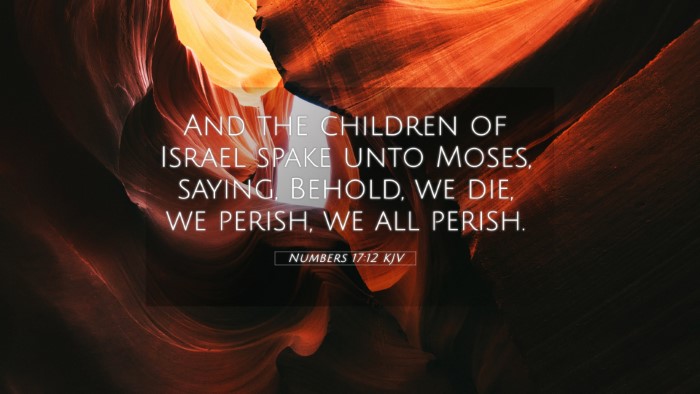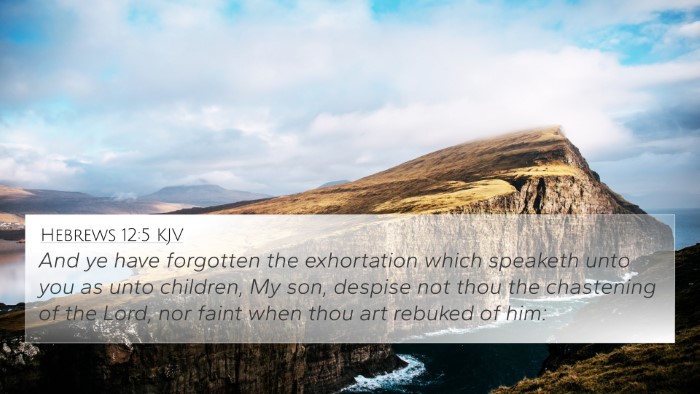Understanding Numbers 17:12
This biblical passage presents a significant moment in the history of Israel and serves as a profound lesson in God's authority and the nature of divine selection.
Verse Overview
Numbers 17:12 states, "And the children of Israel spake unto Moses, saying, Behold, we die, we perish, we all perish." This declaration reflects the fear and anxiety of the Israelites as they confront the consequences of their rebellion against God's chosen leader, Aaron.
Significance in Context
The context of this verse follows the events leading to God’s affirmation of Aaron’s priesthood through the miraculous flourishing of his rod. The people's response exemplifies their recognition of the severity of their situation and the divine order established by God.
Key Themes
- Authority of God: The Israelites' plea highlights the divine authority and selection of leaders.
- Fear of Divine Judgment: The acknowledgment of potential judgment serves as a warning against rebellion.
- God's Mercy: Despite their fear, this moment opens pathways to repentance and understanding.
Commentary Insights
Reflections from prominent public domain commentaries provide valuable insights into the meaning of Numbers 17:12.
Matthew Henry's Commentary
Matthew Henry emphasizes the spiritual consequences of the Israelites’ conduct. He notes that their declaration is not merely a cry of fear, but a recognition of their vulnerability when they step outside God's will. The acknowledgement of their impending perishing points to a deeper spiritual death that occurs when one strays from divine leadership.
Albert Barnes' Notes
Albert Barnes expounds on the emotional and spiritual turmoil of the Israelites. He argues that their desperation reflects a significant turning point: they recognize that rebellion against God’s ordained leadership leads to danger. Barnes also links this to themes of humility and submission to God's chosen leaders.
Adam Clarke's Commentary
Adam Clarke suggests that this verse signifies a pivotal moment of clarity for the Israelites. He discusses the importance of understanding the role of chosen leaders and God's plan. Clarke emphasizes the importance of reliance on God amidst turmoil, advocating for obedience and recognition of divine choice.
Cross-Referencing Biblical Texts
To fully comprehend Numbers 17:12, we can explore a series of interconnected Bible verses that provide context and thematic parallels:
- Hebrews 5:4: Discusses the appointment of priests, emphasizing divine selection.
- Exodus 32:30-31: The people’s acceptance of consequences for their rebellion.
- 1 Corinthians 10:12: A warning against overconfidence and the need for humility.
- Matthew 23:37: Jesus laments over Jerusalem, illustrating the consequences of rejecting God's messengers.
- Romans 13:1: Calls for submission to governing authorities, indicating God’s sovereignty over leadership.
- Acts 5:29: The necessity of obeying God rather than human authorities.
- 1 Peter 2:9: Highlights the concept of a chosen people, emphasizing God's call and selection.
Thematic Connections
The themes explored in Numbers 17:12 connect deeply with narratives found throughout both the Old and New Testaments. It reflects the recurring motif of God’s authority and the consequences of disregarding His chosen representatives. The understanding of these connections can enhance one’s study through tools for Bible cross-referencing, such as a Bible concordance or a Bible cross-reference guide.
Conclusion
The declaration of the Israelites in Numbers 17:12 serves as a poignant reminder of the importance of recognizing God’s leadership and authority in our lives. As we engage in comparative Bible verse analysis, we uncover rich themes of rebellion, fear, mercy, and divine authority echoed throughout scripture.
Further Study
For those interested in exploring deeper connections between similar passages, utilizing cross-referencing Bible study methods can significantly enhance the understanding of biblical themes, fostering a holistic approach to interpreting scripture.








